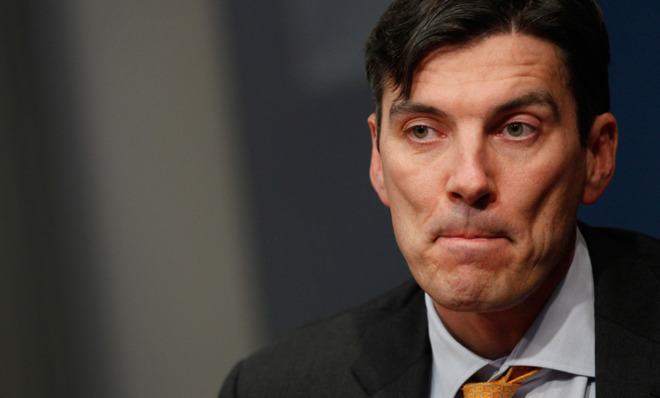4 smart takes on AOL's million-dollar babies
AOL's "gaffe-prone" CEO got in some hot water last week

A free daily email with the biggest news stories of the day – and the best features from TheWeek.com
You are now subscribed
Your newsletter sign-up was successful
AOL's "gaffe-prone" CEO, Tim Armstrong, "got in some hot water" last week, said Tim Fernholz at Quartz. He already had angered employees by announcing that the company would no longer contribute matching funds every pay period to its employees' 401(k) retirement deductions, but rather pay a lump sum at year end — thus punishing anyone who leaves the company. Even worse was his explanation: Armstrong blamed the Affordable Care Act and more specifically two employees' "distressed babies," who he said cost the firm $1 million each. He's not the first boss to make a similar argument, and as the health-care law's provisions take hold, "the 'ObamaCare made me do it' excuse may prove convenient among corporate executives addressing all manner of tricky challenges — price hikes, benefit cuts, layoffs." But when they try this ploy, they should remember Armstrong "and those sick babies.''
One of those "distressed babies" is my daughter, said Deanna Fei at Slate. Armstrong's suggestion "that the saving of her life was an extravagant option, an oversize burden on the company bottom line" was not just ludicrous, but "a cruel violation." Let's ignore the fact that Armstrong took home $12 million in pay in 2012, and that AOL just reported its best financial results in years. "The hardest thing to bear has been the whiff of judgment" in his statement, as if my husband — who works for AOL — and I "selfishly gobbled up an obscenely large slice of the collective health-care pie." When our daughter was born prematurely, we "experienced exactly the kind of unforeseeable, unpreventable medical crisis that any health plan is supposed to cover. Isn't that the whole point of health insurance?" Now a year old and miraculously healthy, our daughter has been through enough. "Having her very existence used as a scapegoat for cutting corporate benefits was one indignity too many."
Armstrong certainly could have been more sensitive, said Timothy Noah at MSNBC, but give him credit for one thing: "honesty.'' He acknowledged that "providing decent health-care coverage requires taking money away from some people in order to give it to other people." In his artless way, Armstrong made the fundamentally redistributive function of health insurance more explicit than is generally "deemed socially acceptable."
The Week
Escape your echo chamber. Get the facts behind the news, plus analysis from multiple perspectives.

Sign up for The Week's Free Newsletters
From our morning news briefing to a weekly Good News Newsletter, get the best of The Week delivered directly to your inbox.
From our morning news briefing to a weekly Good News Newsletter, get the best of The Week delivered directly to your inbox.
Armstrong's statement was "unnecessary, cruel, and dumb," said Ezra Klein at Bloomberg. He should be railing not against ObamaCare, but against "the employer-based health-care system." Armstrong's AOL is "an older company with a large, aging workforce," and it currently spreads its health-care risks over a limited pool of people — his staff. Under ObamaCare, companies will in 2017 be able to get insurance through the state exchanges. That will enable AOL and other companies to "add their employees to a much larger risk pool — in some cases, millions strong.'' One or two sick employees would no longer hurt a company's bottom line. Soon, thanks to ObamaCare, each workplace will no longer be "a tiny welfare state unto itself."
A free daily email with the biggest news stories of the day – and the best features from TheWeek.com
Sergio Hernandez is business editor of The Week's print edition. He has previously worked for The Daily, ProPublica, the Village Voice, and Gawker.
-
 What are the best investments for beginners?
What are the best investments for beginners?The Explainer Stocks and ETFs and bonds, oh my
-
 What to know before filing your own taxes for the first time
What to know before filing your own taxes for the first timethe explainer Tackle this financial milestone with confidence
-
 The biggest box office flops of the 21st century
The biggest box office flops of the 21st centuryin depth Unnecessary remakes and turgid, expensive CGI-fests highlight this list of these most notorious box-office losers